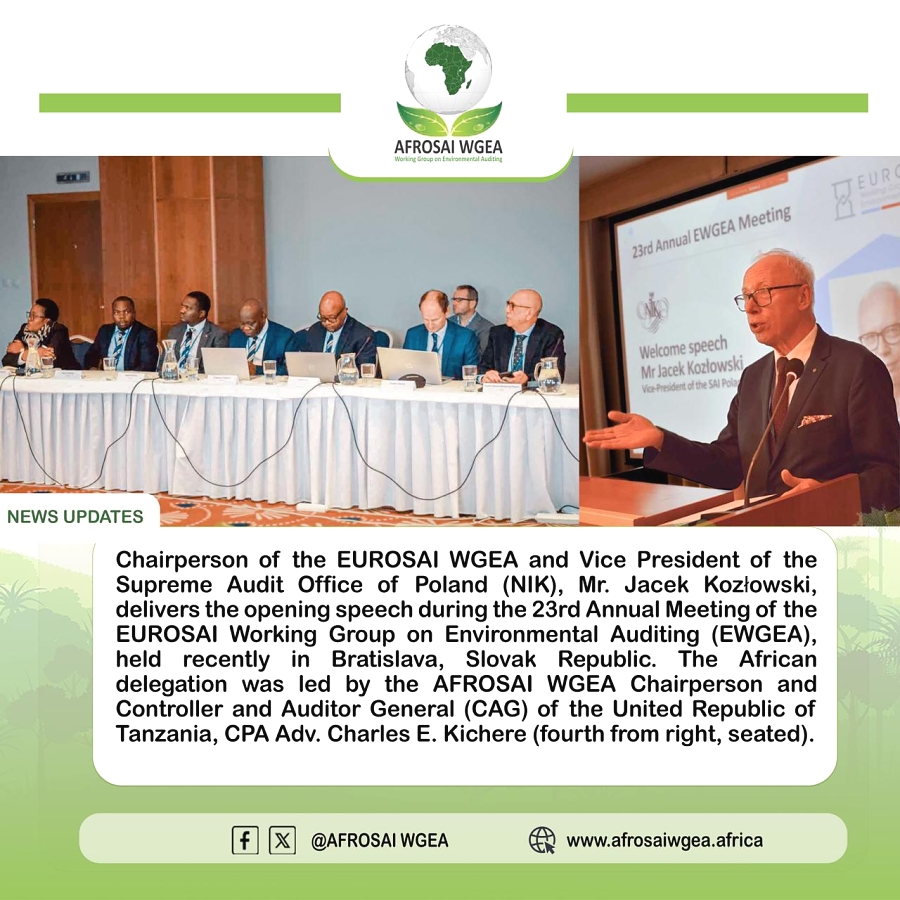
AFROSAI WGEA Chairperson, Mr. Charles E. Kichere (seated fourth from right), attending the 23rd Annual Meeting of the EUROSAI Working Group on Environmental Auditing (EWGEA).
The African voice in environmental accountability resonated at the 23rd Annual Meeting of the EUROSAI Working Group on Environmental Auditing (EWGEA), held from 7–10 October 2025 in Bratislava, Slovak Republic. The AFROSAI WGEA delegation was led by the Chair, Mr. Charles E. Kichere, Controller and Auditor General (CAG) of the United Republic of Tanzania.
The event, held under the theme “Climate–Water–Biodiversity Nexus: Risks, Relations, and Challenges,” provided an essential platform for interregional cooperation, enabling African and European SAIs to exchange experiences, foster partnerships, and promote collective accountability in addressing climate-related challenges.
Under the leadership of Mr. Kichere, the African delegation ensured that the continent’s environmental realities were effectively shared in the global dialogue on climate resilience and sustainable development. During the deliberations, Mr. Kichere insisted on the importance of joining hands in environmental matters even across continents as environmental challenges know no boarders.
A technical paper titled “Strengthening Environmental Governance on Climate Change The Case of Africa’s Experience” was presented on behalf of the AFROSAI WGEA Chair by Mr. James Pilly, Assistant Auditor of the National Audit Office of Tanzania and Secretary General of the AFROSAI WGEA Secretariat. The presentation reflected the collective experience of African SAIs.
Key highlights of the presentation included:
The strategic role of Supreme Audit Institutions (SAIs) in ensuring that climate finance is accessible, transparent, and impactful.
The power of transboundary collaboration, exemplified by the River Niger Basin joint audit, which brought together nine African SAIs to address shared water and biodiversity risks.
Tanzania’s pioneering audits on Carbon Trade Management, the Desertification Programme, and Flood Management, which have served as catalysts for institutional reform and stronger environmental resilience.
Mr. Pilly emphasized that SAIs across Africa are evolving “from counting trees to asking why the forest is disappearing,” underscoring a shift from measuring damage to shaping solutions.
The meeting was officially opened with welcoming remarks by Mr. Ľubomír Andrassy, President of the Supreme Audit Office (SAO) of the Slovak Republic, followed by `. Both speakers emphasized the importance of strengthening regional working groups as engines for innovation, collaboration, and exchange of good practices in environmental auditing.
The opening session concluded with a group photo session, symbolizing unity and partnership between SAIs of Europe and Africa in their shared commitment to environmental accountability and sustainability.
The collaboration between AFROSAI WGEA and EUROSAI WGEA continues to serve as a vital bridge between continents fostering joint audits, shared methodologies, and global dialogues on environmental governance.
The participation of AFROSAI WGEA in Bratislava reaffirmed Africa’s readiness to be a proactive partner in shaping the global environmental governance agenda. The meeting underscored that Supreme Audit Institutions are not just oversight bodies, but architects of accountability and partners in building climate resilience.
Moving forward, AFROSAI WGEA will continue to strengthen peer learning, promote regional joint audits, and foster capacity building across African SAIs. The Secretariat remains committed to transforming lessons from international engagements into practical frameworks that empower SAIs to hold governments accountable for a sustainable and equitable future for Africa.
 15 Oct, 2025
15 Oct, 2025
 18 Sep, 2025
18 Sep, 2025
 18 Sep, 2025
18 Sep, 2025
 07 Aug, 2023
07 Aug, 2023